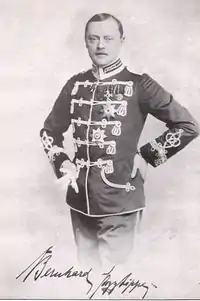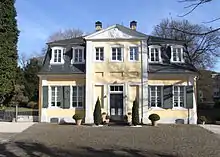Prince Bernhard of Lippe (1872–1934)
Prince Bernhard of Lippe (Bernhard Kasimir Wilhelm Friedrich Gustav Heinrich Eduard; Oberkassel, 26 August 1872 – Munich, 19 June 1934) was a member of the Lippe-Biesterfeld line of the House of Lippe. He was the father of Prince Bernhard of Lippe-Biesterfeld, the prince consort of Queen Juliana of the Netherlands.
| Prince Bernhard of Lippe | |||||
|---|---|---|---|---|---|
 Prince Bernhard of Lippe ca. 1909 | |||||
| Born | 26 August 1872 Oberkassel, Kingdom of Prussia | ||||
| Died | 19 June 1934 (aged 61) Munich, Nazi Germany | ||||
| Spouse | Armgard of Sierstorpff-Cramm | ||||
| Issue | Bernhard, Prince of the Netherlands Prince Aschwin of Lippe-Biesterfeld | ||||
| |||||
| House | House of Lippe | ||||
| Father | Ernest II, Count of Lippe-Biesterfeld | ||||
| Mother | Countess Karoline of Wartensleben | ||||
Biography
Prince Bernhard of Lippe, born as Count of Lippe-Biesterfeld in Oberkassel on 26 August 1872, was the 2nd son of Ernest II, Count of Lippe-Biesterfeld, regent (1897–1904) of Principality of Lippe, and his wife Countess Karoline von Wartensleben. He was a younger brother of Leopold IV, Prince of Lippe, who succeeded as reigning Prince of Lippe in 1905. He pursued a career as a soldier, serving in the Prussian Army, and attaining the rank of major.
The Lippe-Biesterfeld family had lived at Oberkassel, Bonn, ever since 1770, when count Frederick William (1737–1803) had married Elisabeth Johanna, Edle von Meinertzhagen (1752–1811), who inherited a small manor house at Oberkassel where the couple moved from Biesterfeld in 1770, and which became the home to the family for the following 209 years. Beethoven is said to have been a piano teacher to the couples' children. The manor house and farm at Biesterfeld were demolished around 1820. Prince Bernhard acquired the Reckenwalde castle in eastern Brandenburg (today Wojnowo, Poland), the family's new estate, where his children grew up.
 Lippe House at Oberkassel, Bonn
Lippe House at Oberkassel, Bonn Reckenwalde castle, Brandenburg
Reckenwalde castle, Brandenburg
On 4 March 1909, Bernhard entered into a morganatic marriage with Baroness Armgard von Sierstorpff-Cramm, widowed Countess von Oeynhausen. Before this marriage, his wife was granted the title Countess of Biesterfeld (Gräfin von Biesterfeld) on 8 February 1909. She and her two sons Bernhard and Aschwin were created Princess (Prince) of Lippe-Biesterfeld (Prinzessin (Prinz) zur Lippe-Biesterfeld) on 24 February 1916 with the style Serene Highness,[1] which brought their children into a more senior place in the line of succession, in which they hitherto had been the very last. The suffix Biesterfeld was revived to mark the beginning of a new cadet line.[2][3][4] They had two sons:
- Prince Bernhard of Lippe-Biesterfeld (29 June 1911 – 1 December 2004), married in 1937 to Juliana of the Netherlands, had issue.
- Prince Aschwin of Lippe-Biesterfeld (13 June 1914 – 14 May 1988), married in 1951 to Simone Arnoux, no issue.
Ancestry
| 16. Karl, Count of Lippe-Biesterfeld | |||||||||||||||||||
| 8. Ernst, Count of Lippe-Biesterfeld | |||||||||||||||||||
| 17. Countess Ferdinande of Bentheim-Tecklenburg-Rheda | |||||||||||||||||||
| 4. Julius, Count of Lippe-Biesterfeld | |||||||||||||||||||
| 18. Karl Philipp von Unruh | |||||||||||||||||||
| 9. Modeste Christiane von Unruh | |||||||||||||||||||
| 19. Elisabeth Henriette Dorothea von Kameke | |||||||||||||||||||
| 2. Ernest, Count of Lippe-Biesterfeld | |||||||||||||||||||
| 20. Count Friedrich Carl of Castell-Castell | |||||||||||||||||||
| 10. Friedrich, Count of Castell-Castell | |||||||||||||||||||
| 21. Countess Amalie of Löwenstein-Wertheim-Virneburg | |||||||||||||||||||
| 5. Countess Adelheid of Castell-Castell | |||||||||||||||||||
| 22. Karl Ludwig, Prince of Hohenlohe-Langenburg | |||||||||||||||||||
| 11. Princess Emilie of Hohenlohe-Langenburg | |||||||||||||||||||
| 23. Countess Amalie Henriette of Solms-Baruth | |||||||||||||||||||
| 1. Prince Bernhard of Lippe | |||||||||||||||||||
| 24. Count Leopold Alexander of Wartensleben | |||||||||||||||||||
| 12. Count Cäsar Alexander of Wartensleben | |||||||||||||||||||
| 25. Caroline Louise Dorothea von der Recke | |||||||||||||||||||
| 6. Count Leopold Otto of Wartensleben | |||||||||||||||||||
| 26. Carl Georg Friedrich von Gfug | |||||||||||||||||||
| 13. Friederike von Gfug, Heiress of Osniszczewo | |||||||||||||||||||
| 27. Johanna Juliane von Lestwitz | |||||||||||||||||||
| 3. Countess Karoline of Wartensleben | |||||||||||||||||||
| 28. Johannes Arnold Halbach | |||||||||||||||||||
| 14. Arnold Halbach | |||||||||||||||||||
| 29. Maria Gertrud Hilger | |||||||||||||||||||
| 7. Mathilde Halbach | |||||||||||||||||||
| 30. Bohl Bohlen | |||||||||||||||||||
| 15. Johanna Caroline Mathilda Bohlen | |||||||||||||||||||
| 31. Johanna Magdalene Oswald | |||||||||||||||||||
References
This article is based on this article on Dutch Wikipedia.
- Almanach de Gotha (179th ed.). Justus Perthes. 1942. p. 79.
- Jean-Fred Tourtchine, 'Généalogie et état présent des familles princières de Lippe-Biesterfeld (princes souverains de Lippe) et de Lippe-Weissenfeld', in: L'ordre de la noblesse. Familles d'Europe enregistrées in ordine nobilitatis en 1983–1984. Volume sixième 1983-194. [Paris, 1985], p. CCLVXXXVI.
- Zijl, Annejet van der, Bernhard, een verborgen geschiedenis pp 45 en 87" p 45 ...bood Leopold aan Armgard de oude graventitel van de Biesterfelders toe te kennen – zij het met het laagadellijke 'von' in plaats van het hoogadellijke 'zur'. Deze nieuwe Biesterfelderlijn zou wel meetellen in de erfopvolging, maar in lijn moeten aansluiten achter de overige zijtakken." "p 87 ....kende hij in dit ene en hoogst uitzonderlijke geval ..... alsnog de prinselijke titel 'zur Lippe-Biesterfeld' toe ... en zijn familielijn maakte een flinke sprong vooruit in de erfopvolging."
- Prinses Armgard verkreeg in 1909 voor haar en haar nakomelingen de titel Gravin (Graaf) van Biesterfeld en in 1916 bij decreet van de laatste regerende vorst van Lippe. Leopold IV die van Prinses (Prins) van Lippe-Biesterfeld. Hierdoor werd de nieuwe Biesterfeldse linie gesticht, die in de rij van hen die tot troonopvolging in Lippe gerechtigd zijn, vóór die van het Lippe-Weissenfeldse vorstelijk huis gaan Gedenkalbum uitgegeven bij het koperen huwelijksfeest van het Koninklijk echtpaar door de NV drukkerij De Spaarnestad Haarlem voor de abonnees van haar periodieken, 1949 p. 12.